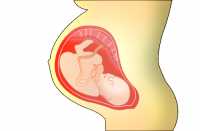MedicalResearch.com Interview with:
Krista F. Huybrechts, MS PhD
Associate Professor of Medicine
Brigham and Women’s Hospital
Harvard Medical School
Boston, MA 02120
MedicalResearch.com: What is the background for this study? What are the main findings?
Response: Pregnant women often experience nausea and vomiting, particularly during the first trimester. Early treatment is recommended to relieve symptoms and prevent progression to hyperemesis gravidarum. Although not formally approved for this indication, ondansetron is the most frequently prescribed treatment for nausea and vomiting in pregnancy in the US: 22% of pregnant women reportedly used ondansetron in the US in 2014. Despite this common use, the available evidence on the fetal safety of ondansetron is limited and conflicting, and the possibility of a doubling in risk of cleft palate and cardiac malformations has been raised.
We therefore evaluated the association between ondansetron exposure during the first trimester of pregnancy, the period of organogenesis, and the risk of congenital malformations in a cohort of 1,816,414,publicly insured pregnancies using the nationwide Medicaid Analytic eXtract data for 2000-2013. A total of 88,467 women (4.9%) were exposed to ondansetron during the first trimester. After adjusting for a broad range of potential confounding variables, we found no association with cardiac malformations (RR = 0.99; 95% CI, 0.93 – 1.06) and congenital malformations overall (RR = 1.01; 95% CI, 0.98 – 1.05). For oral clefts, we found a 24% increase in risk (RR=1.24; 95% CI, 1.03 – 1.48), which corresponds to an absolute risk of 2.7 per 10,000 births (95% CI, 0.2 – 5.2 per 10,000 births). These findings were consistent across sensitivity analyses, conducted to address potential misclassification and confounding bias.
(more…)




















 Josephine Funck Bilsteen, MSc
Department of Pediatrics, Hvidovre University Hospital, Hvidovre,
Section of Epidemiology, Department of Public Health
University of Copenhagen
Copenhagen, Denmark
MedicalResearch.com: What is the background for this study? What are the main findings?
Response: The background of this study is that there is increasing recognition of the longer-term health and social outcomes associated with preterm birth such as independent living, quality of life, self-perception and socioeconomic achievements. However, much less is known about differences in education and income among adults born at different gestational weeks in the term period.
In this study shorter gestational duration, even within the term range, was associated with lower chances of having a high personal income and having completed a secondary or tertiary education at age 28 years. This is the first study to show that adults born at 37 and 38 completed weeks of gestation had slightly lower chances of having a high income and educational level than adults born at 40 completed weeks of gestation.
Josephine Funck Bilsteen, MSc
Department of Pediatrics, Hvidovre University Hospital, Hvidovre,
Section of Epidemiology, Department of Public Health
University of Copenhagen
Copenhagen, Denmark
MedicalResearch.com: What is the background for this study? What are the main findings?
Response: The background of this study is that there is increasing recognition of the longer-term health and social outcomes associated with preterm birth such as independent living, quality of life, self-perception and socioeconomic achievements. However, much less is known about differences in education and income among adults born at different gestational weeks in the term period.
In this study shorter gestational duration, even within the term range, was associated with lower chances of having a high personal income and having completed a secondary or tertiary education at age 28 years. This is the first study to show that adults born at 37 and 38 completed weeks of gestation had slightly lower chances of having a high income and educational level than adults born at 40 completed weeks of gestation. 






 Dr Sarah Myers PhD
Honorary Research Associate
UCL Department of Anthropology
MedicalResearch.com: What is the background for this study?
Response: Postnatal or postpartum depression is unfortunately common after giving birth; a figure often quoted is 15%, but some studies have found much higher numbers. Postnatal depression is associated with a range of poorer outcomes for mothers and their infants, and the financial costs of treating maternal mental ill health put health services under considerable strain. Studies have found that providing additional emotional support to at risk mothers, for instance via peer support programmes or regular phone calls with health visitors, can reduce the likelihood of them developing the condition. Therefore, it is really important that we understand the full range of risk factors that put women at greater risk of becoming depressed after giving birth.
There is increasing evidence for a link between inflammation and depression, with factors that trigger an inflammatory immune response also increasing the likelihood of depressive symptoms. The opens up the possibility of finding new risk factors for postnatal depression based on known associations with inflammation.
Dr Sarah Myers PhD
Honorary Research Associate
UCL Department of Anthropology
MedicalResearch.com: What is the background for this study?
Response: Postnatal or postpartum depression is unfortunately common after giving birth; a figure often quoted is 15%, but some studies have found much higher numbers. Postnatal depression is associated with a range of poorer outcomes for mothers and their infants, and the financial costs of treating maternal mental ill health put health services under considerable strain. Studies have found that providing additional emotional support to at risk mothers, for instance via peer support programmes or regular phone calls with health visitors, can reduce the likelihood of them developing the condition. Therefore, it is really important that we understand the full range of risk factors that put women at greater risk of becoming depressed after giving birth.
There is increasing evidence for a link between inflammation and depression, with factors that trigger an inflammatory immune response also increasing the likelihood of depressive symptoms. The opens up the possibility of finding new risk factors for postnatal depression based on known associations with inflammation.

